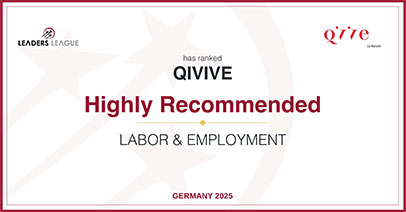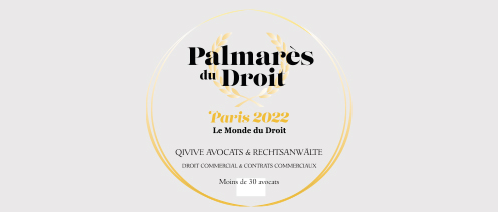 International arbitration
International arbitration
Conflicts between business partners cannot always be avoided – the question is how to resolve them efficiently. For commercial enterprises, arbitration proceedings are often an attractive alternative to state court proceedings.
But what are the special features of arbitration? And what should companies pay particular attention to if the place of arbitration is France or Germany?
As a Franco-German law firm specializing in French and German law, Qivive supports companies in resolving disputes professionally and with legal certainty – including in the context of arbitration proceedings.

Our services in
international arbitration
- Assessment of the chances of success of arbitration proceedings, elaboration of a negotiation and procedural strategy
- Pre-procedural negotiations
- Representation in institutional and ad hoc arbitration proceedings
- Representation with regard to the recognition and enforcement of arbitral awards
- Representation in annulment proceedings
- Representation in revision proceedings
- Co-advisory activity in our foreign colleagues' proceedings , in which German or French law plays a role
- Arbitrator assignments
- Advice on the use and drafting of arbitration clauses in contract negotiations
Do you need an experienced lawyer for international arbitration proceedings?

1
Information on
international arbitration
1
What is arbitration?
Arbitration is a private and alternative dispute resolution mecanism to state court proceedings.
It is usually based on an arbitration clause agreed between the parties. In this clause, the parties submit any disputes to arbitration instead of going to a state court. They often also determine the place of arbitration, the language of the proceedings, the number of arbitrators and, if applicable, the arbitration institution.
Arbitration proceedings can be divided into two categories: institutional and ad hoc proceedings. In institutional proceedings, a designated institution (e.g. ICC, DIS, AFA, CIAM- CIAR, SCAI, LCIA, ICDR, SCC, DIA, FIA, SIAC,CEPANI or VIAC) assumes certain administrative tasks, such as the transmission of briefs. The scope and nature of these tasks can vary depending on the institution. However, the actual decision on the dispute is always reserved for the arbitration tribunal. In ad hoc proceedings, on the other hand, either the arbitration tribunal itself takes on these administrative tasks or they are delegated to a third party.
The arbitrators - often specialized lawyers or industry experts - are appointed by the parties themselves. The arbitrators' decision (the so-called "arbitral award") is generally final and binding. It can only be overturned by state courts in very limited cases: there is no appeal, only limited grounds for annulment.
Practical tip
Make sure to formulate the arbitration clause precisely and with legal certainty. Incorrect clauses often lead to unnecessary disputes about jurisdiction of the arbitral tribunal.
2
What are the advantages of arbitration?
Arbitration proceedings offer a number of advantages over court proceedings:
- Confidentiality: Arbitration proceedings are generally not public. This protects business secrets and safeguards the reputation of the parties involved.
- Flexibility: Arbitration proceedings allow the parties to tailor the proceedings to their own needs in a number of ways: The parties can choose not only the arbitrators, but also the arbitration institution and procedural rules, the place of arbitration, the language of the proceedings (e.g. German,French or English), as well as the venue (usually including the option of holding the hearing online). In addition, the parties can agree on the issues to be decided by the arbitrator(s). In contrast, a state court regularly decides on all legal issues raised. However, there is a fundamental rule that must be observed at all times: the parties must be treated equally and each party must have the right to be heard.
- Expertise: The arbitrators usually have special expertise in the relevant technical or legal field.
- Enforceability: Arbitration awards are enforceable in over 160 countries on the basis of international agreements, such as the New York Convention of 1958.
- Time efficiency: Well-organized arbitration proceedings can be concluded more quickly than traditional court proceedings and therefore offer an economical solution.
- Settlement rate: The settlement rate in arbitration proceedings is significantly higher than in state court proceedings.
Practical tip
Make sure that the qualifications of the arbitrators are determined as early and precisely as possible. This will ensure that the proceedings lead to a fair decision that is acceptable to all parties involved.In particular, it is advisable to look specifically for arbitrators who have special knowledge in the relevant sector and legal field and, in the case of cross-border disputes, have the necessary language skills and intercultural abilities.
3
What are the advantages of arbitration?
In addition to the arbitration clause and other party agreements, which have almost unrestricted top priority in the context of arbitration proceedings, selected statutory provisions apply. In particular, the arbitration law of the place of arbitration (which may differ from the place of enforcement of the arbitral award) is of great importance.
The legal framework for arbitration proceedings with a place of arbitration in France is governed by Articles 1442 et seq. of the French Code of Civil Procedure (Code de procédure civile). Since the 2011 reform, it has been considered one of the most modern arbitration laws in Europe.
The legal basis for arbitration proceedings with seat in Germany can be found in §§ Sections 1025 et seq. of the German Code of Civil Procedure (ZPO). In 1998, these provisions were reformed and aligned with the UNCITRAL Model Law on International Commercial Arbitration (UNCITRAL Model Law on International Commercial Arbitration). This brings German arbitration law in line with internationally recognized standards and best practice.
If the parties have opted for arbitration proceedings administered by an arbitration institution, the corresponding arbitration rules also apply.
Practical tip
When drafting the arbitration clause, you should select the place of arbitration and the arbitration institution with particular care. These two factors largely determine the applicable arbitration law and the arbitration rules.To avoid surprises later on, it is advisable to carefully check the relevant rules and statutory provisions in advance. This is the only way to ensure that the procedure meets your expectations and that the legal framework is clear.
4
How do arbitration proceedings work?
If the parties have chosen an arbitration institution to conduct the arbitration, the conduct of the proceedings shall be governed by the rules of arbitration of the designated institution. If the parties have opted for ad hoc arbitration, the procedure will be determined by the arbitral tribunal together with the parties. In addition, the parties can adapt the procedure to their needs by agreement.
Arbitration proceedings are therefore generally more flexible than state court proceedings. Nevertheless, there is a standard procedure that can be found in most international arbitration proceedings:
|
|
|
|
|
|
|
|
Practical tip
Please note that the arbitration rules of the various arbitration institutions may deviate from this procedure or may stipulate certain requirements.The arbitration rules of the chosen institution must therefore be read carefully before initiating the proceedings an the various steps must be well prepared with your lawyer.
Do you need legal representation in institutional or ad hoc arbitration?
2
How does Qivive support you
in arbitration proceedings?
Our experienced arbitration lawyers will support you in all aspects of institutional and ad hoc arbitration proceedings. Our support ranges from assessing the chances of success of an arbitration procedure to developing an efficient and cost-effective negotiation and procedural strategy. We accompany you throughout the procedure and can advise you on your choice of arbitrator. Finally, in the post-arbitration phase, we represent you and advise you in the recognition and enforcement of arbitral awards, as well as in annulment proceedings.
Our expertise
in international arbitration
- experienced trilingual arbitration lawyers with dual training in German and French law
- assisting companies in arbitration proceedings with links to Germany and France
Our most recent cases
in international arbitration
- Automotive | Representation in a dispute with a commercial agent (ICC Arbitration, seat in Germany)
- French shipping agent | Representation in an action following the termination of a liner shipping agency agreement (ad hoc arbitration, seat in Germany)
- Operator of a nationwide network of petrol stations in an African country | Representation in a dispute with a supplier concerning a distribution agreement (ICC Arbitration, seat in France)
- Swiss financial institution | Strategic advice in the context of a multiparty proceeding under French law, including allegations of corruption in connection with a major international project, as well as representation in setting aside proceedings in France (ICC Arbitration, seat in France)
- Digital innovator in the automotive sector | Representation in a dispute concerning a licence agreement (CMAP Arbitration, seat in France)
- French fashion producer | Representation in a dispute against a German company about a sub-license contract (ICC Arbitration, seat in Germany)
- Spanish hotel owner | Representation in pre-trial negotiations against a German tour operator
Are you looking for a law firm to assist you in an ICC or DIS arbitration?







